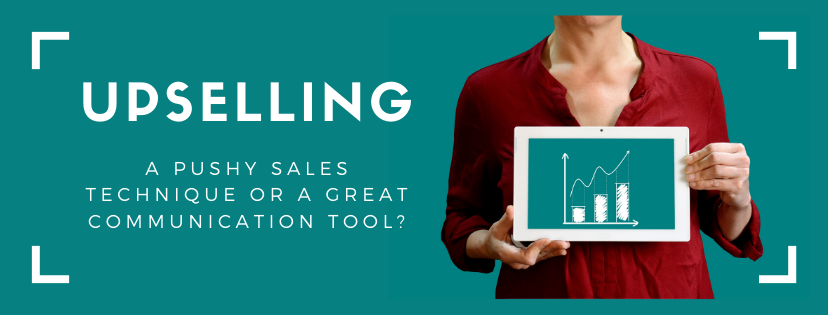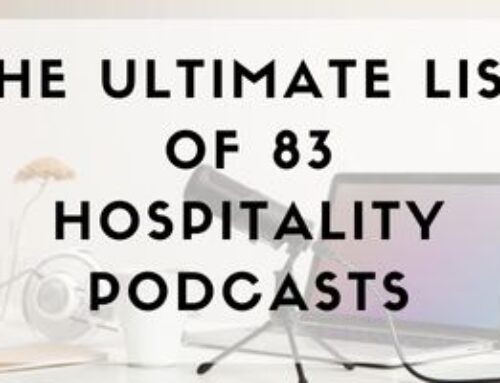
Upselling – A Pushy Sales Technique or a Great Communication Tool?
People are talking and writing about it more than ever – ways to create more revenue at hotels.
Positive news of consumers’ strong intent to travel after the crisis paired with first signs of demand recovery in China have raised an important topic in the hospitality industry: how can hotels make the most of returning demand?
‘Upselling’ is a recurring answer to this question. But while some hoteliers are on fire for this approach, others write it off as a pushy sales technique they don’t want to harass their guests with.
But is upselling really that bad? Or could it be more than just a way to drive ancillary revenue in hotels?
I asked a few experts on the topic and they shared interesting insights on how hotels can go about upselling, so properties and their guests can enjoy a win-win situation.
First of all…
What is upselling and cross-selling? A quick introduction
In short, upselling means you offer customers a similar yet higher-priced product to the one they chose. For hotels, this means suggesting the more expensive deluxe room to a guest booking a standard room.
Cross-selling is when you promote an additional product which would go well with something a customer has already bought. A hotel may offer an airport transfer, laundry service or a tour package to guests who recently reserved a room.
It’s here, it’s there, it’s everywhere
Now, before you go on judging hotels for trying to push people to spend ‘so much extra money’, think about how common both upselling and cross-selling are today. It’s everywhere and we accept or even expect it.
When you go to McDonald’s, the clerk asks you if you want the supersize meal or whether you’d like fries with your order. Airlines offer you emergency row seats for extra $$ because of their legroom. On Amazon, the subtle yet effective ‘Customers Who Bought This Item Also Bought’ area generates 35% of the retail giant’s revenue.
Not bad, eh? Seeing numbers like that makes me wonder why more hotels don’t jump at the opportunity to promote offers, services and amenities they have at their hotel anyway.
Upselling then and now
At hotels, upselling started with front desk agents offering guests a higher room category on arrival. This tedious process has low success rates and even comes with some disadvantages.
Check-in is drawn out by the upselling pitch and guests who opt in have to wait while housekeeping and room service scramble to prepare the new room.
Cross-selling was similar. The front desk agent or concierge would highlight hotel amenities and encourage guests to book a dinner table or a spa treatment. After that, it was largely up to the guest to take action.
Today, new software allows hotels to take a more efficient and effective approach. They can send both upsell and cross-sell offers pre-arrival and target guests by segment rather than relying on general email blasts with generic promotions.
What upselling and cross-selling really are
When asked about upselling and cross-selling, experts often give this familiar-sounding definition: offering the right product to the right guest at the right time.
This summarizes the important aspects of relevance, timing and segmentation perfectly. But upselling and cross-selling can be so much more when they’re done right.
However, many hoteliers leave active cross-selling on the sidelines and only focus on upselling to make some extra revenue when overbooking a low room category.
And while that’s a great place to start, using upselling just for that would be like using only the large blade on your Swiss Army knife and never trying the scissors, can opener or the small blade.
Expanding the idea of upselling and cross-selling
With upselling apps allowing hotels to reach out to guests pre-arrival, the opportunities for promoting services and products other than room upgrades have expanded greatly.
By telling guests about your offers before they stay with you, you do two important things:
- You inform them about options they might otherwise miss
- You give them the option to choose add-ons they want at their convenience
Hans Schmidtner, founder and operations manager at UpsellGuru, an innovative upselling solution for hotels, calls this the ‘billboard effect’ of upselling and cross-selling. He highlights that it plays an important role in improving the guest experience, generating great reviews and ensuring repeat business.
Simple and effective
This takes away the stress of having to rattle off an endless list of services and promotions from the front desk and makes check-in more pleasant for guests.
Think about it… they just had a long trip and probably want to go to their room to relax and freshen up as quickly as possible.
While they might be happy to reserve a table for tonight’s dinner or take you up on another relevant offer, most of your other packages or services would go unmentioned and unnoticed in this situation.
That leads to you missing out on extra revenue and a chance to delight your guests, while your guests miss out on a fantastic experience.
Keep it pain-free
Guests are usually reminded of the money they are spending on a room during check-in and handing over their credit card for a guarantee can feel almost as painful as buying something.
This means they’ll be less interested in adding expenses by booking a spa treatment or a limousine transfer.
But if you can extend your offer pre-arrival or, if relevant, during the stay, chances of conversion are much higher.
Encouraging communication throughout the guest journey
Daan de Bruijn, founder and CEO of Bookboost, a direct communication and upsell tool for hotels, explains that it’s time to start seeing the guest journey as a whole.
Instead of looking at the booking process, the in-house and the post-stay time as separate, it’s important to view them as a single process and create a suitable communication option for each stage.
For example, this means sending more than just a dusty confirmation email when someone books.
Instead, try proactively reaching out to guests with personalized messages and relevant offers. That way you can lower the communication threshold, become more approachable and open the door to guests who have questions and requests.
Shifting towards a relationship-centric approach
Making it easy and effortless to get in touch with the hotel throughout the guest journey, can make people feel more like they are messaging a friend rather than a business or a corporate entity.
This creates a personal connection, encourages people to share their feedback and leads to more positive word of mouth, Daan elaborates.
Pre-arrival upselling and cross-selling via email or SMS can play a big part in this approach. By putting targeted offers in front of guests and letting them decide, hotels adopt a true ‘guest first’ approach. In Hans’ words: “Upselling and cross-selling put the guest in the driver’s seat during all stages of their journey.”
It’s always about making the most of guest data
Sending guests a slew of untargeted offers will likely create two problems:
- Low conversion rates because your offers are too generic
- Annoyed guests because they feel like you’re selling just for the sake of it, not to enhance their experience (and who can blame them?)
But it doesn’t have to be like that.
Loïc Gabriël, Sales Manager at Oaky, a fully automated pre-arrival upselling platform, puts it best when he says: “A great advantage of upselling is that it gives you a chance to learn more about what your guests value and need during their stay. With this information, you can create unique experiences and truly wow them.”
Wondering how to do that? Enter… guest segmentation!
When applied properly, segmentation based on the guest information stored in the PMS is a powerful tool that can help you send guests the offers they want to see (and buy).
A solo business traveler, for example, will be more interested in express laundry service than a Champagne welcome in the room. It’ll be the other way around for guests who are on their honeymoon or an anniversary trip.
Now you may be thinking that going through all your reservations manually to decide which deals to pitch to guests would be more hassle than it’s worth. And that’s probably true.
That’s why it’s smart to put this task in the hands of automated upselling tools. They can pull PMS data, segment guests, send them highly targeted offers and get a higher conversion rate than front desk upselling or cross-selling could.
The role of upselling and cross-selling post-COVID-19
With hotels having lost several months of revenue and the rebound being slower than initially expected, it’s important to make the most of every booking.
“We know that occupancy won’t magically go back to pre-crisis levels. The reopening period will probably be slow and painful. That’s why an even bigger focus needs to be put on every single guest staying at your property to maximize average spend and revenue,” says Clément Dénarié, Head of Sales at Oaky.
Make every interaction count
But it’s not just about generating as much revenue as you can (although that’s certainly important).
It’s also about ensuring guests have the best possible experience at your hotel, so they come back in the future, spread positive word of mouth and encourage others to travel too.
“A ‘guests first’ approach is more important now than ever before, and upselling does exactly that. Whether you’re a big branded property or small independent hotel, having an upsell strategy is one of the most powerful ways to increase revenue, to personalize and enhance your guests’ experience. Both these points will be crucial once business picks up after COVID-19,” Hans explains.
Loïc adds that he expects many travelers will now prefer taking advantage of more on-site services since they trust the hotel’s hygiene measures and want to avoid unnecessary risks.
This gives hoteliers a great chance to wow guests with creative deals and offers. For example, how about thinking of a way to turn in-room-dining into an experience rather than just another TV dinner?
Communicate proactively
Today, hotels have a unique chance to proactively help guests make their stay feel safer and more comfortable.
You can do this through information and offers centered around hygiene and physical distancing, and by encouraging communication during and after the booking process.
At first, many people will feel uncertain about traveling. Showing guests what you are doing to keep them safe and offering them ways to customize their stay in a way that makes them more secure can help them confidently make decisions and plan trips.
Using pre-arrival messages, with or without paid offers, will allow you to communicate about on-site safety measures and to keep the door open for any guest who has questions.
Final words of advice from upselling experts
Now, before we wrap this up, here are some final words of upselling advice from the experts.
Hans from UpsellGuru suggests: “Have a strategy on how you can upsell in all stages of the guest journey. Include every step from the booking process, the pre-stay period and the arrival, to the stay and post-stay phases.
Staff training and the right technology are key to help hoteliers do that and achieve great results. Both are easy to implement and very profitable.”
Clément and Loïc from Oaky emphasize that you should get to know your guests and put yourself in their shoes. Then, go further than just answering their needs, try to surprise and delight them.
They also recommend this: “It’s important for hotels to be ready for when they can re-open. Use this time to evaluate processes and the tech solution you are using.
Create a competitive advantage by piloting new technologies, not only upselling tools but also revenue or operational management solutions. Many companies are offering free trials right now. Why not make use of that offer?”
Finally, Daan from Bookboost advises making upselling all about the guest. “Make them feel like you care about them having the best experience at your hotel.
Make your offer personal and highlight what’s in it for them. When you do this, your upsells won’t be perceived as pushy but as a great way for them to get even more out of their trip.”
Now, it’s your turn! With so much great advice on upselling, what could possibly go wrong if you gave it a try?
There’s no need to go crazy here.
Start with a popular offer or service you already have at your hotel and begin promoting it more actively to guests before they arrive.
And don’t forget: upselling and cross-selling can look a little different at every hotel. Play around and see what works best for you and your guests.
Let me know how it goes!







Leave A Comment